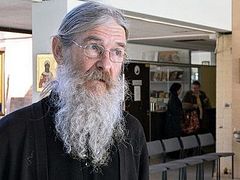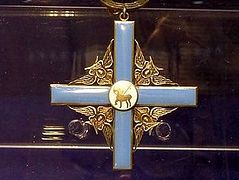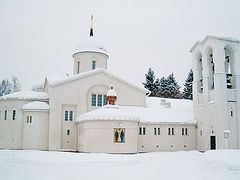Part 1. “Each One of Us Is Eternal” A Monastery in Finland
Hannu Pöyhönen, Ph.D in Theology, who together with his companions has been building a monastery in the town of Lammi in southern Finland, the most densely populated region of the country, is talking on the qualities that people need to in order be called Orthodox Christians not just nominally but by right. The professor is confident that one of these qualities is… hatred.
What we need is bread and not plastic packaging
—It would be strange to combine Christianity and hatred…
—Elder Sophrony (Sakharov) used to say that nobody can become a true model of Christian life and lead others to Christ unless he comes to hate himself.
—What does it mean?
—In my view, we must come to hate in ourselves all the things that prevent God from working on the improvement of our hearts. We need to hate these things wholeheartedly. And here we see yet another Christian paradox: Such hatred for ourselves turns into genuine love for God and our neighbors—and this love makes us worthy of being called human beings. Upon fulfilment of this condition real brotherly love becomes possible: if someone sees and feels our sincere care, if he knows that we are not indifferent to him, understands that we pray for him from the bottom of our hearts, then he is sure to reciprocate and return our feelings and actions. If we don’t take care of our neighbors and are unwilling to serve them, then, I would say, our Christianity will be just nominal and formal that has nothing to do with Christ, no matter how many times we call ourselves Orthodox.
—But love for our neighbors presupposes hard work, sometimes strictness.
—Absolutely right. You know, if we humor people, “pat them on the back” and say that such-and-such things are allowed in the Church of Christ, that “it is normal” (for example, sodomy, bribery, alcoholism, etc.), then someone who is earnestly seeking Christ will instinctively feel falsehood: Did the Apostle Paul, who was in “travail” until Christ was reflected in his spiritual children, indulge their sins? Didn’t he urge them to get rid of their sins so they could be like true Christians? It is same nowadays, for Christ is the same yesterday, today and forever (cf. Heb. 13:8). An attempt to combine the commandments of the Gospel with aspirations for “a life of ease”, self-indulgence, and even hypocritical justification of sins is something like “plastic packaging”. And you won’t be satisfied with plastic—you need real bread to eat. And many people feel this and seek “daily bread” and not plastic. “If your Christianity is nothing but plastic, then I will look for something else.” Thus people find themselves in sects, in Eastern and pagan cults with their gurus, etc. And later they find a bottomless abyss there as well…
A very little leaven
It seems that now we, Orthodox Christians, just need to be Orthodox to save people from this abyss.
—What does “just to be Orthodox” mean?
—To uphold traditions. I don’t mean outward traditions, such as headscarves and candles; I mean keeping the core of the Holy Tradition.
—But in order to keep it people need to familiarize themselves with Tradition and the writings of the Holy Fathers.
—Yes. And we have been working on this: we have already translated a number of patristic works, along with other books, and we’ve been publishing translations made by others.
—From Greek?
—Yes, mostly from Greek. But from Russian too—for example, Everyday Saints and Other Stories; from Romanian—on Elder Cleopa (Ilie); and from English—a children’s book on Orthodoxy. All in all, the volume of Orthodox literature in Finnish has grown several times over in the past twenty years, and we are happy about that. There is also ascetic literature, letters of the holy fathers and saints of recent times, along with fiction. Thus, today any Finn has an opportunity to study the tenets of the Orthodox faith and Tradition in his native language.
I am well aware, let us put it cautiously, that there is much more Orthodox literature in Russia than in Finland. But we should take into account the fact that our Church is very small and has far fewer resources than the Church in our neighboring country. Statistics show that there are fewer than 60,000 Orthodox faithful in Finland.
We published a small book on the Orthodox Church’s position on homosexuality. Our task was to show that this position has never changed over the centuries. We collected citations from the Old and New Testaments, writings of the Church Fathers, ascetics of olden times, and contemporary elders, and suggested that our readers think about whether changes in convictions are always for the good, whether in rejecting our own principles for the sake of current fashion we lose ourselves. We decided to prepare this book because of a discussion in an Orthodox magazine where a priest, to our astonishment, not only justified this sin but also proposed that the Church change its attitude towards homosexuality, which is scary in itself. Just imagine: to stop calling a sin a sin! Likewise, we can stop calling theft, alcoholism, and murder a sin… The sin will remain, but we will not repent of it anymore. Phenomena like this are very alarming.
We have also been selling a book by one Protestant physician, who writes about the balefulness of abortions and asks the following question: What is more important—human life or this notorious “independence”? Incidentally, it is currently a very popular book.
What makes us happy, brother?
Studying and upholding the patristic tradition convinces you of the truth of another paradox: It is only by struggling with false, “plastic” happiness that you find true happiness. Indeed, what can make you happier than an earnest, though difficult, struggle with your sins? After all, you feel the help of Christ in this warfare, which means you are not alone, you are with God. I recall my conversation with Abbot Aimilianos (Vafeidis) [the newly-reposed elder: 1934—May 2019, who served as Abbot of Simonopetra Monastery from 1974 till 2000.—Trans.] during my first pilgrimage to Mt. Athos. He said during that meeting: “All those who struggle with their passions, no matter how difficult it is for them, are truly happy.” And his words were engraved in my memory forever.
In my view, we have been infected by sin so much that we don’t understand our own happiness properly anymore. For some, happiness is measured in millions of euros, for some—in the kilos of black caviar at the table, for others—in something else. But there is no eternity beyond all these millions and quantities. To be more exact, there is an eternity behind them, but a very sad one. However, we begin to have a foretaste the good eternity when we begin to struggle with our passions and reorder our priorities in spiritual and material life.
—And you with your companions, your brethren, have been trying to organize a monastery here for over six years. I feel certain that you have plenty of challenges.
—We know from Church history that the organization of any monastery or church has never been smooth sailing. You cannot imagine how many problems have befallen us in this time. We know it from experience, we have seen it with our own eyes that the hatred of the evil spirit is very real. In addition to financial difficulties, there have been suspiciousness, slander, insults, and other delusions.
—But you persist.
—Yes, we don’t give up and keep going with God’s help. We follow the old rule: “Do what you must do, and come what may.” We know that we labor for the sake of God and our neighbor. We see that people need a place like ours—they want to experience Orthodoxy. Who are we to turn them down?
A Russian baker to a Finnish Pekka1
In addition to problems there are good examples thanks to which you understand that people have not forgotten God. We are eating good, soft bread with you now—do you know where it came from? From Helsinki, some ninety-three miles away from here! There is a bakery there, which donates some of its bread for Church needs on a daily basis. Once our Greek friend talked with their Russian baker. And they said: “Of course, we prefer to give away the surplus bread to the needy rather than throw it away!” And he takes bags of bread and conveys them to various churches, care homes, and distributes among the poor. So the situation is not hopeless—people still remember Christ.
Frankly speaking, we have gotten used to miracles. That is quite easy, especially when you know that you are not alone—you are with God. It sometimes seems that we have no more strength to stand firm, the evil forces overpower us, and we can hardly expect any help from anywhere—but help comes at the most difficult moment. This gives us the strength to carry on our labors. And if we had given way to despair, we would have left this place at the very beginning. But we keep going. God won’t let us be tested beyond our strength. At the same time, we have a fine opportunity to become aware of our own weakness. To tell the truth, we have nothing to be proud of.
This is a spiritual law: …If thou come to serve the Lord, prepare thy soul for temptation (Sir. 2:1). But we find the continuation particularly encouraging: Set thy heart aright, and constantly endure, and make not haste in time of trouble. Cleave unto Him, and depart not away, that thou mayest be increased at thy last end (Sir. 2:2-3). So we live by this hope. I hope you understand that verse 3 refers to spiritual things and not worldly ones. We used to talk a lot about this with our dear Elder Paisios, who was canonized a few years ago.
—Did you meet with St. Paisios the Hagiorite?
—Yes, we did several times. But we will talk about this a bit later.
(To be continued).





